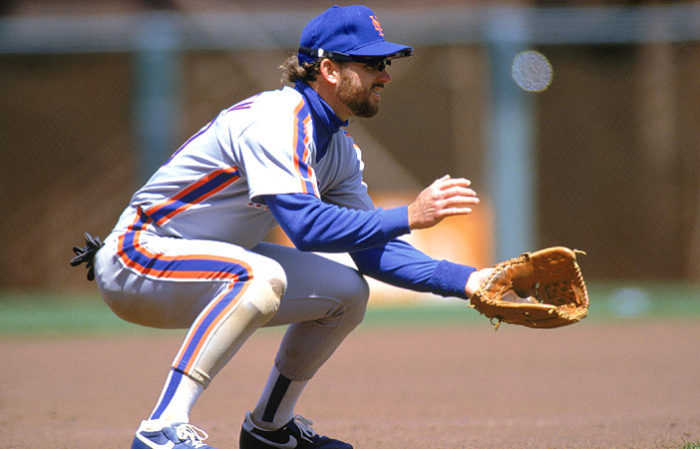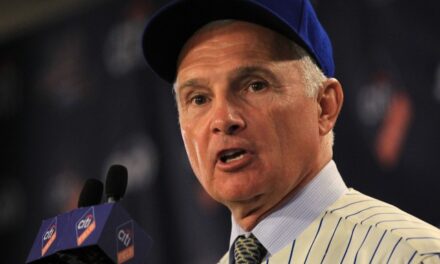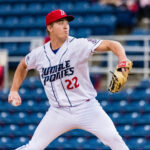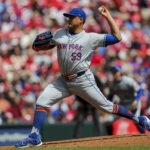
It’s been five years since anyone in baseball has recorded a 30/30 season, the rare feat of hitting 30 home runs while stealing 30 bases. The last two players to reach the milestone were Mike Trout and Ryan Braun in 2012, who both finished second in their league in MVP voting.
Dating back to 2007, only 12 players have reached that mark, including beloved Met third baseman David Wright in ’07. Wright had his best statistical season that year, reaching career highs in the triple-slash line of average, on-base percentage and slugging.
He was also the first Met player to achieve a 30/30 season since 1991 when another beloved third baseman was recording his third such season within a five-year span.
Howard Johnson, or “HoJo,” was a rare combination of speed and power in the late 1980s to early ’90s.
Drafted by the Detroit Tigers in the first round of the January 1979 secondary draft as a pitcher, Johnson was soon converted to the infield where the Tigers saw promise of his talents; swiping 103 bases and slugging 58 home runs from 1979-82.
Johnson, 56, got an early taste of success in his career, winning a championship with the Tigers in ’84 and starting the season as their regular third baseman before being replaced by Marty Castillo, Tom Brookens and Darrel Evans. Johnson received just one plate appearance in the ’84 Fall Classic.
Unbeknownst to Johnson, the New York Mets had been scouting and eyeing the young third baseman for two years, looking to add power and depth to their team. In the winter of ’84, the Tigers dealt Johnson to the Mets for right-handed pitcher Walt Terrell. Mets’ General Manager Frank Cashen was much intrigued by the power that Johnson might be able to tap into.
”At 24, Mr. Johnson has yet to touch the tip of his athletic abilities,” Cashen said in a New York Times article. ”The 12 home runs he hit last season are just a small sample of the power he can bring to our lineup. We feel he will add a new dimension to our attack. Finding a power hitter is very hard to do. We’ve been interested in Howard Johnson for two years. I’d expect him to hit somewhere around 20 home runs for us.”
From 1985-86, Johnson split time at third with Ray Knight, while also seeing some time at shortstop in the ’86 season. Once again, HoJo was dealing with another crowded logjam at third base. However, with Knight departing via free agency in 1987, Johnson was given the opportunity to start, despite early competition from rookie infielder Dave Magadan.
With the increased playing time, the switch-hitting third baseman took advantage and put up the power numbers that Cashen had envisioned he would. From 1987-91, Johnson slugged 157 home runs, with only three players hitting more in that span: Mark McGwire (175), Darryl Strawberry (172) and Jose Canseco (171).
He also stole 160 bases in that time, with just 12 players ahead of him and only one of them with over 100 home runs in that stretch (Barry Bonds, 126).
Over his career, Johnson left his mark on the Mets franchise. With the aforementioned three 30/30 seasons with the club, Johnson also ranks 3rd all-time in stolen bases (202), 4th in home runs (192), 4th in walks (556) and 5th in doubles (214).
After his retirement in ’97, Johnson was hired as a scout for the Mets, a position he held until he was named hitting coach for the Brooklyn Cyclones in their inaugural season in 2001. He managed the squad in the ’02 season, followed by stints as hitting coach for the St. Lucie Mets, Binghamton Mets and Norfolk Tide.
He eventually landed the Mets’ first base coaching position in ’07, before being named hitting coach halfway through the year until the conclusion of 2010. He now manages the Down East Wood Ducks, the Class-A Advanced affiliate of the Texas Rangers.
I had the privilege of speaking with Johnson prior to a night game, where we touched on the trade that sent him to the Mets, his time in New York, and who he thought would win in an ’84 Tigers vs. ’86 Mets World Series matchup.
MMO: You were originally drafted as a pitcher by Detroit, and then the Tigers converted you to the infield. Did you know from the beginning that you were going to be moved from the mound, and what was that process like for you early on?
Howard: Well, it wasn’t unexpected. I played shortstop, center field; I played different positions as well as pitch.
It was a little bit of a transition but for the most part that happened in spring training. Going into my first minor league season in 1979, I was the shortstop on the team for the first month or so. I never really got on the mound.
MMO: So, they were upfront with you from the beginning about their desire to see you in the infield?
Howard: Yeah. They told me they were going to do it in kind of reverse. They said, “We think you could be a good player, so we want to give you every opportunity to do that. And if that for some reason doesn’t work out, we’ll put you on the mound.”
MMO: What was your initial reaction when you heard you were being traded to the Mets in December of ’84 after winning the World Series with the Tigers?
Howard: I was excited about it because I had met Davey [Johnson] before a long time ago. I grew up in Clearwater and that’s where the Phillies’ spring training is, so I had met him before and always liked him. I was a National League fan anyway and had grown up there.
It was a good opportunity. I was happy to be coming to a team that was on the rise for sure because the year before they had played really well. That’s when [Darryl] Strawberry, [Dwight] Gooden, and those guys were just cracking through. That was a good opportunity for me to be a part of that.
MMO: That ’86 team is one of the most beloved teams in Met history, and viewed as one of the greatest teams in baseball history. What about your club in ’86 made it so special and unique?
Howard: I would say that the biggest thing that made us different was we were very close-knit, we didn’t allow any kind of distractions to come in and deter us from winning and playing hard.
I give a lot of credit to Davey [Johnson] for that because he had a unique way of just kind of dealing with all the personalities and making sure that they didn’t bubble over or that we had any issues.
He used all the players, every one of us in different ways. He was very creative and gave us a lot of freedom. He was really good at just dealing with the different personalities that were there. He just had a really good way about that and I think that was something that set us apart, our locker room.
MMO: July 22, 1986, the famous brawl with Cincinnati. You pinch-hit in the ninth and stayed in the game, eventually hitting the game-winning home run in the fourteenth inning. That’s considered one of the wildest games in recent memory, considering all the ejections, players moving across the field including pitchers. What stands out about that game to you most?
Howard: I remember we tied the game up. Dave Parker dropped the ball in right field, which would’ve been the third out. He dropped the ball, we tied the game up and I was in at shortstop. That was the game that Eric Davis slid into third base and he and Ray Knight got into a fight.
Those guys got thrown out and there was a bunch of changes going on with the lineup. We had Gary playing third, that’s when Davey had Jesse [Orosco] and Roger [McDowell] switching on and off in right field and left field, which was the first time I had ever seen that which I thought was unreal! I was like, That’s pretty smart!
We finally broke through in the fourteenth inning and I hit a three-run home run to put us on top for good. That was definitely one of those games that solidified our desire and fortitude to get through anything.
MMO: In Game 6 of the ’86 World Series, you were on deck when Mookie Wilson was at bat. What was your game plan for Bob Stanley had Mookie walked and you were up at the plate?
Howard: I had faced Stanley before and I was just kind of preparing for that. I felt comfortable against him and was just mentally going through the things you do on deck, kind of waiting to hit and have a plan of what you were going to do, and just waiting to see what was going to happen.
The at bat just went so long. Mookie did a great job and fouled off a lot of pitches and the wild pitch and all that. There was just a lot of stuff that went on that didn’t happen quickly, it seemed like it took forever. I guess when you look back on it, it happened pretty fast.
I was just getting ready to hit and when I saw the ball come off of Mookie’s bat I knew it was going to be a little bit tricky because Shea’s field at times could be a little bit tricky.
Sure enough, I watched Buckner get into position and he got there kind of late and the ball played him. It got under his glove and I could almost see it happen before it even happened. When it went through his glove it was just like, we got this. It was pretty cool, it was awesome to see that!
MMO: From 1987 to 1991, only three players (McGwire, Strawberry and Canseco) hit more home runs than you did (157). What do you attribute that kind of success to; was it simply getting the chance to play every day?
Howard: Wow! I mean, I know the other two guys I guess were doing steroids and I didn’t utilize that despite at the time. [Laughs.] Straw was just a tremendous hitter. For me, it was just more playing time. I hit home runs in the minor leagues, I stole bases in the minor leagues.
It was just that time in my career, I was 26-years-old, and I felt physically that I was in my absolute prime, or just about ready to get into my prime. I was just learning more about hitting and the way I looked at it was, I looked at my at bats from the year before. I think I had 220 AB and hit 10 home runs. I thought, Okay, if I play every day I figure those numbers would probably double. I had done it in the minor leagues and I’m sure my numbers will progress by playing more.
I just worked so hard that winter to be ready to play every day and especially to be a good right-handed hitter. I had a great year right-handed in ’87, and I never really duplicated it but for whatever reason it just all came together that year.
Just playing every day, getting better, and everything was aligned perfectly and the opportunity was there and I took advantage.
MMO: You had a mixture of speed and power during your prime, which has become rare in today’s game. How important was the speed element for you in your game, and do you wish the game still had more power/speed guys in it?
Howard: Yeah, I mean, I was always a good runner and I could steal bases. I wasn’t the fastest guy on the team but I had a good knack for getting a good jump and I studied it and I watched and I made it an art unto itself. I used to read about Lou Brock and all the things he did and I just took it to another level.
I wanted to create havoc whenever I was on base. The whole reason behind it, Mathew, was – I forgot where I heard it a long time ago when I was a kid – you want to make an impact on the game. My goal was, I think it might have been Bud Harrelson that told me, if you can drive in a run or score a run every game it’s runs produced that’s important.
If you can figure out a way to create runs when they walk you then you’re going to be that much more valuable. So I tried to do that. If I got my walk at least I was able to steal a base, get into scoring position for my team, and possibly score a run. Then you throw the home runs in there and the RBIs and stuff, and all of a sudden you’re becoming an offensive producer and in a lot of different ways.
I do wish guys would run more but they don’t as much anymore. I can tell you it puts a lot of pressure on the defense and it creates a lot of easy RBI opportunities for your offense.
MMO: You got to work with a young David Wright while you were in the Mets’ minor league system when he was coming up, and obviously were with him when you were a coach with the Mets. What was your relationship like with David early on, and how soon did you realize he was going to be something special with the team?
Howard: I knew from the beginning he was going to be special. Keith Miller’s a good friend of mine and he was one of my teammates with the Mets and he was David’s agent and Keith would call me up and say, “Hey, does he remind you of anybody?” He said, “He reminds me of you.”
I told him, ‘Well, we’ll find out!’
I just tried to take him under my wing and nurture the ability that he had and give him everything that I had and just get him ready to play in New York.
That was a big goal. We had some good players on those young teams in the minor leagues, [Angel] Pagan was one of them. Those are special guys with a lot of ability and you just want to help that ability grow and you want to teach it and see how far they can go.
Fortunately, I was able to coach David a few years in the big leagues and helped him get his 30/30 season my first year up there. And I was able to be his hitting coach for a few years when he went through a lot, so it was a lot of fun to be a part of that and see David kind of mature and become the guy that he is now.
MMO: Do you still keep in touch with David?
Howard: Yeah, I still stay in touch with him. We shoot texts back and forth periodically, just checking in on each other. I know he’s going through a lot of issues right now physically, and I haven’t been through any to that extent, but I know it’s not easy and it’s not fun.
I know it’s hard for him because there’s a lot of expectations on the Mets and he’s being paid a lot of money and he doesn’t want to be on the sidelines so I think he feels like he’s got a lot to make up for.
MMO: You’ve had a lot of experience as both a coach and a manager in the Mets’ system. I know you’re currently managing with the Wood Ducks (Class-A Advanced for the Texas Rangers), do you have aspirations of managing in the big leagues one day?
Howard: I mean, possibly. You never know. I enjoy my job, I enjoy being a part of managing the game, the players, and just trying to get the most out of them. Some years you have really nice chemistry and get really good players and good things really happen. Other years you don’t and you just try to find the right mix.
The bottom line for me, Mathew, and I’ve always believed this as a coach, that no matter what I try to find the absolute most value I can help create with a player. It doesn’t matter if they’re the best player or the worst player on the team, you want to create as much value as you can for that guy because you never know where they could be involved in a trade or they can suddenly just take off. Maybe their bodies change, you never know what’s going to happen. You never want to give up on a guy, you want to make sure you give him as much of yourself as you can.
You have to try and create value for players because you just never know where they’re going to end up and where you’re going to end up. You can come across some really nice talent and be with another organization and say hey, I remember this guy.
Nowadays, you have analytics and I’ve been studying that somewhat now this year, learning how to read some of the things we have with the Rangers. There’s a lot of good information that you can glean from it and certain baselines and things like that, that is important.
MMO: Other than the championship in ’86, what moments do you hold dear from your time in New York?
Howard: Probably the 30/30 years. Those were always a lot of fun because it was such a grind and it becomes a goal that you want to try to achieve. From a personal standpoint, leading the league in home runs and runs batted in in 1991. That was probably the single most achievement that I never dreamed to be possible.
It just goes to show you that hard work can really pay off if you just dedicate yourself and things happen along the way. You can do a lot of great things and I just never really thought that would happen. I never even made that a goal, put it that way. Never in a million years.
MMO: Okay, putting you on the spot here: The ’84 Tigers vs. the ’86 Mets in a World Series match-up, who are you going with to win it all?
Howard: That’s a tough one there! I probably would take the Mets only because from a pitching perspective the Mets team had a deeper starting rotation. Jack Morris and Dwight Gooden, those two guys, Mathew, and I’ve told people this before, I said if I had to pick one game to win and if we lost I was going to be executed [Laughs] I would choose either Doc or Jack Morris to win that game. Either one of those two guys I would put on the mound to win it.
So you’ve got those two guys on the mound and then you had [Dan] Petry and [Milt] Wilcox, and of course, you had [Ron] Darling and Sid [Fernandez]; you’ve got depth. Then your bullpen, I think the Tigers bullpen was pretty good, a little underrated I think. But the Mets bullpen was deep and had a lot of different pieces to it that Davey used very, very well.
I think in that regard, if pitching is going to win it at the end, then I think the Mets might take that.
MMO: Thank you so much for your time today, Mr. Johnson. Best of luck with the rest of the season!
Howard: Okay, appreciate it. Any time!
Follow Howard Johnson on Twitter, @20Hojo















